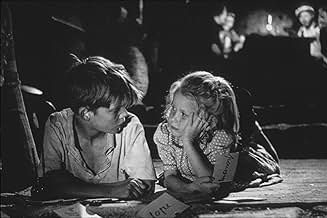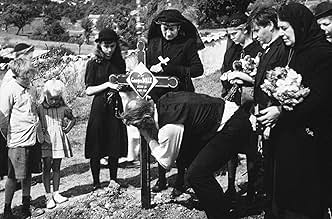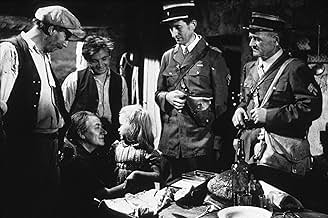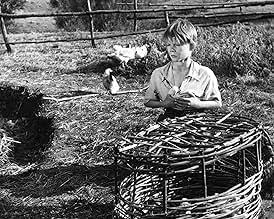A young French girl orphaned in a German air attack is befriended by the son of a poor farmer, and together they try to come to terms with the realities of death.A young French girl orphaned in a German air attack is befriended by the son of a poor farmer, and together they try to come to terms with the realities of death.A young French girl orphaned in a German air attack is befriended by the son of a poor farmer, and together they try to come to terms with the realities of death.
- Nominated for 1 Oscar
- 8 wins & 2 nominations total
Marcel Mérovée
- Raymond Dollé
- (as Pierre Merovée)
Denise Péronne
- Jeanne Gouard
- (as Denise Perronne)
Marie-Pierre Casey
- Infirmière
- (uncredited)
André Enard
- Le premier gendarme
- (uncredited)
Marcelle Feuillade
- La mère de Paulette
- (uncredited)
Roger Fossey
- Le père de Paulette
- (uncredited)
Featured reviews
I am incapable of writing reams about films I admire because words do no justice to the magic they conjure.
FORBIDDEN GAMES left me speechless when I first saw it two decades ago.
It is ABOUT two French children, a peasant boy, a Parisian girl, who become close friends as World War 2 ravages Europe.
The film LOOKS at the way warfare effects the innocent and transforms one's view of death.
Director Rene Clement sets the story in a rural village and peoples his story with some of the most authentic characters ever to tred the silver screen. He employs humour, horror and humanism to tell his story and solicits an incredible performance from moppet Brigitte Fossey.
It's a tearjerker, too, it's emotionally delicate, and it's perfectly manipulated drama -- all good drama is.
Its power is its apparent simplicity.
A love letter to cinema that is also one of the greatest and most haunting war movies ever made.
The imagery and the heart-rending music score will remain with you forever.
FORBIDDEN GAMES left me speechless when I first saw it two decades ago.
It is ABOUT two French children, a peasant boy, a Parisian girl, who become close friends as World War 2 ravages Europe.
The film LOOKS at the way warfare effects the innocent and transforms one's view of death.
Director Rene Clement sets the story in a rural village and peoples his story with some of the most authentic characters ever to tred the silver screen. He employs humour, horror and humanism to tell his story and solicits an incredible performance from moppet Brigitte Fossey.
It's a tearjerker, too, it's emotionally delicate, and it's perfectly manipulated drama -- all good drama is.
Its power is its apparent simplicity.
A love letter to cinema that is also one of the greatest and most haunting war movies ever made.
The imagery and the heart-rending music score will remain with you forever.
This movie is a solid reminder of how a film does not need to be graphically violent, sex- ridden, and controversy-drenched to really affect the viewer. I picked this movie up from my local library and have watched it twice in the last two days. I chose this title simply because it bore the Criterion Collection emblem on the jacket cover and I had heard nothing about the movie at all before that time.
That being said, i knew very little of what to expect nor would i be prepared for the power of this movie.
From the opening scenes, the audience is thrown into a world of chaos and terror. This world is then filtered through the eyes of Paulette, a young french girl, as she struggles to find safety and peace from the destruction and displacement of world war two. She meets a young farm-boy, Michel, with whom she instantly bonds. Michel and Paulette begin to play games (hence the title) and create worlds separate from the noise and confusion of adults. Together they search for peace within their microcosm, and, in their own way, serve as symbols for love and friendship as Michel attempts to constantly make Paulette happy and Paulette, in turn, gives Michel something his large family never has time to award him: love.
Through breathtaking cinematography and flawless acting, Forbidden Games captivates and holds that captivation for its entirety. With strong anti-war messages this film still pertains to the present and will continue to stay relevant so long we as a human race continue to make war. There will always be children that will have to somehow rationalize the seemingly unfathomable actions of adults and there will always be adults who should turn to their children to learn the simple pleasures of life ignored in the bustle of growing old.
That being said, i knew very little of what to expect nor would i be prepared for the power of this movie.
From the opening scenes, the audience is thrown into a world of chaos and terror. This world is then filtered through the eyes of Paulette, a young french girl, as she struggles to find safety and peace from the destruction and displacement of world war two. She meets a young farm-boy, Michel, with whom she instantly bonds. Michel and Paulette begin to play games (hence the title) and create worlds separate from the noise and confusion of adults. Together they search for peace within their microcosm, and, in their own way, serve as symbols for love and friendship as Michel attempts to constantly make Paulette happy and Paulette, in turn, gives Michel something his large family never has time to award him: love.
Through breathtaking cinematography and flawless acting, Forbidden Games captivates and holds that captivation for its entirety. With strong anti-war messages this film still pertains to the present and will continue to stay relevant so long we as a human race continue to make war. There will always be children that will have to somehow rationalize the seemingly unfathomable actions of adults and there will always be adults who should turn to their children to learn the simple pleasures of life ignored in the bustle of growing old.
The first thing to bear in mind is that "Jeux interdits" was first a short ,part of a film made up of sketches -two others were to be made.For financial reasons,they were eventually jettisoned ,and "jeux interdits" had to be fleshed out to the proportions of a feature-length film.So additional scenes were shot more than one year after the first ones...and of course the children had grown up! Clement and his team had to make wonders to hide that.And they outdid themselves so brilliantly that nobody saw their "effects".
Now for the ending:Clement wanted a prologue and an epilogue:Fossey and Poujouly would read a book which told the tale of two children (Paulette and Michel).Those short sequences were eventually withdrawn,which explains this unexpected ending which still baffles the audience today.
As for the movie,needless to say it's one of the most important works of the French cinema.Some users did comment it so well I won't add anything except for Brigitte Fossey's performance,which will remain the most powerful one for such a young child.It was not surprising that Fossey enjoyed a brilliant career when she grew up...even if she never found a part so striking afterward.
Now for the ending:Clement wanted a prologue and an epilogue:Fossey and Poujouly would read a book which told the tale of two children (Paulette and Michel).Those short sequences were eventually withdrawn,which explains this unexpected ending which still baffles the audience today.
As for the movie,needless to say it's one of the most important works of the French cinema.Some users did comment it so well I won't add anything except for Brigitte Fossey's performance,which will remain the most powerful one for such a young child.It was not surprising that Fossey enjoyed a brilliant career when she grew up...even if she never found a part so striking afterward.
10Jack-151
This is very nearly a perfect film. There have been many films about children, but few are strong enough to allow for innocence and honesty to co-exist. Jeux Interdits (Forbidden Games) makes no such compromises. Hollywood would have traded a happy (and phony) ending for poignancy. Beautiful cinematography.
I am really drawn to art that makes clean choices about messy things in order to deliver the richness of the mess cleanly.
Its a complicated set of tradeoffs, part abstracting things away, part enriching or amplifying things. Cinema is different than any other art because nominally we presume we are seeing reality. The people and things we see are real and the situations seem real.
But what we actually get is refined. There are two pleasures to such projects. One is the inhaling of the world we are presented with, then living with it as it commingles with our blood. The other is a sort of external appreciation of what choices were made, how expertly the arrows were made, and what craft there was in how we were tracked and captured.
This is a wonderful film in both respects and likely will stay with you dually for the rest of your life. Clean and messy.
One of the messes is accidental, as is probably true in most real art. The story is truncated abruptly because funding was. If you didn't know that, you might be amazed at how adroitly this storyteller dropped the narrative to keep us in the story once it has ended. And you might marvel at how appropriate that is, given the girl's own loss of story.
The nominal threads are about losses and the superficialities of religion to cover them. This is wrapped in an evocation of dear childhood, innocence, deep bonds, impulsive large projects. And of course, adults who have no idea of the real world nor appreciation for the bonds to it. We can get all this because the ordinary skills (acting, writing, staging) are performed so well that they get out of the way.
(However, along the way we become aware that the filmmaker murders a finally twitching puppy before our eyes.)
I'd like to highlight the external view, the one that looks as what is refined and what leavened. Simplified in story thread and child's perspective. Enriched in emotion, engagement and unexpected shape. Its sweet and dark both. Its emotionally casual and deeply affecting both. Its both distinctly French and universal, something that is rare in my experience. Bresson can't touch this.
Ted's Evaluation -- 3 of 3: Worth watching.
Its a complicated set of tradeoffs, part abstracting things away, part enriching or amplifying things. Cinema is different than any other art because nominally we presume we are seeing reality. The people and things we see are real and the situations seem real.
But what we actually get is refined. There are two pleasures to such projects. One is the inhaling of the world we are presented with, then living with it as it commingles with our blood. The other is a sort of external appreciation of what choices were made, how expertly the arrows were made, and what craft there was in how we were tracked and captured.
This is a wonderful film in both respects and likely will stay with you dually for the rest of your life. Clean and messy.
One of the messes is accidental, as is probably true in most real art. The story is truncated abruptly because funding was. If you didn't know that, you might be amazed at how adroitly this storyteller dropped the narrative to keep us in the story once it has ended. And you might marvel at how appropriate that is, given the girl's own loss of story.
The nominal threads are about losses and the superficialities of religion to cover them. This is wrapped in an evocation of dear childhood, innocence, deep bonds, impulsive large projects. And of course, adults who have no idea of the real world nor appreciation for the bonds to it. We can get all this because the ordinary skills (acting, writing, staging) are performed so well that they get out of the way.
(However, along the way we become aware that the filmmaker murders a finally twitching puppy before our eyes.)
I'd like to highlight the external view, the one that looks as what is refined and what leavened. Simplified in story thread and child's perspective. Enriched in emotion, engagement and unexpected shape. Its sweet and dark both. Its emotionally casual and deeply affecting both. Its both distinctly French and universal, something that is rare in my experience. Bresson can't touch this.
Ted's Evaluation -- 3 of 3: Worth watching.
Did you know
- TriviaIn a television interview ("Vivement Dimanche Prochain", France 2, 17 April 2005) Brigitte Fossey, who played the little Paulette, revealed that the film had originally been shot as a short, and then it was later decided to extend it into a feature film. Unfortunately she had lost her milk teeth and Georges Poujouly (who plays the boy Michel) had had his hair cut to play in We Are All Murderers (1952). So, in many scenes of the movie Paulette has false teeth and Michel is wearing a wig.
- GoofsThe poor parents are killed by a Focke-Wulf 190. This kind of plane didn't exist at the moment of the "battle of France" in May and June 1940.
- Crazy creditsThere are two alternate opening credits:The main credit starts with a story book and a female hand opens the book to reveal the credits. The alternate still has the same book but this time we are introduced to the two main characters who are sitting by a lake. In this version, Michel's hand is turning the page and in between the scenes he tells Paulette that he's going to tell a story.
- ConnectionsFeatured in Le ciné-club de Radio-Canada: Film présenté: Jeux interdits (1959)
- How long is Forbidden Games?Powered by Alexa
Details
- Release date
- Country of origin
- Official site
- Language
- Also known as
- Zabranjene igre
- Filming locations
- Production companies
- See more company credits at IMDbPro
Box office
- Gross US & Canada
- $33,284
- Opening weekend US & Canada
- $4,316
- Apr 26, 2015
- Gross worldwide
- $33,897
- Runtime
- 1h 26m(86 min)
- Color
- Aspect ratio
- 1.37 : 1
Contribute to this page
Suggest an edit or add missing content



























